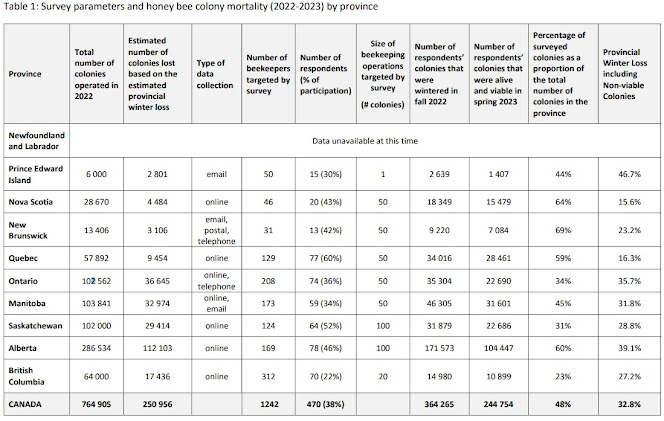In this week’s blog we will give a brief overview of the “Preliminary Report on Honey Bee Wintering Losses in Canada (2023)” which is a yearly report provided by the Canadian Association for Professional Apiculturists (CAPA). This report presents the preliminary data collected by the provinces of Canada regarding honey bee losses for the winter of 2022-2023, and the final data will be published in the annual statement on honey bee wintering losses in Canada. Read today’s blog for a summary of these results.
A Summary of Canadian Honey Bee Overwintering Losses in 2023
The CAPA “Preliminary Report on Honey Bee Wintering Losses
in Canada” is an annual report published to consolidate information that CAPA
and our provincial apiarists have collected regarding the overwintering success
of beekeepers across the nation. Reporting overwintering losses to CAPA
continues to be a valuable tool for seeing trends in beekeeping operations
nationwide.
This data is collected from beekeepers that own and operate
a specified number of colonies (Table 1). The survey reports data from
full-sized producing honey bee colonies that wintered in Canada and does not
include nucleus colonies. The definition of a viable or successful honey bee
colony (single or double) is a colony that survived the winter with a minimum
of 4 frames with 75% comb area covered with bees on both sides. The date at
which colony survival is assessed is different for various provinces. The date
of assessment is May 1st for British Columbia, May 15th
for the Maritime provinces and Quebec, and May 21st for Alberta,
Manitoba, Saskatchewan and Newfoundland and Labrador. This year, results are
based on the responses of 1,242 Canadian beekeepers with a total of 764,905
hives.
The national overwintering loss was 32.8%, which is down 12.7% from the previous year’s winter loss. Between provinces, there was a large range from 15.6% to 46.7%. Nova Scotia and Quebec fared better than most of the nation, by being the only two provinces to report losses below 20%. Prince Edward Island suffered higher losses, at 46.7%.
Some of the main causes for winter loss include starvation,
ineffective varroa mite control, poor queens, weak colonies in the fall, and
weather. The final statement on honey bee wintering losses in Canada will
provide additional information about the leading causes for overwintering loss
by province. Typically, provinces with high amounts of loss also have high
amounts of varroa mites. It is important for beekeepers to best prepare for
these leading causes of winter loss during their late summer and fall
management practices. Now is the time to test for mites and subsequently treat.
Additionally, hives should be supplied with adequate food resources to make it
through the winter, and weak hives should be addressed.
The CAPA wintering losses survey provides us with valuable insight
into the challenges and successes of the Canadian beekeeping industry. For more
information on the results be sure to read the final annual statement on
honey bee wintering losses in Canada when it is released. Thank you
to all beekeepers who participated in this year’s survey!
Connecting with ATTTA Specialists
If you’d like to connect with ATTTA specialists or learn more about our program, you can:
visit our website at https://www.perennia.ca/portfolio-items/honey-bees/
Email abyers@perennia.ca

